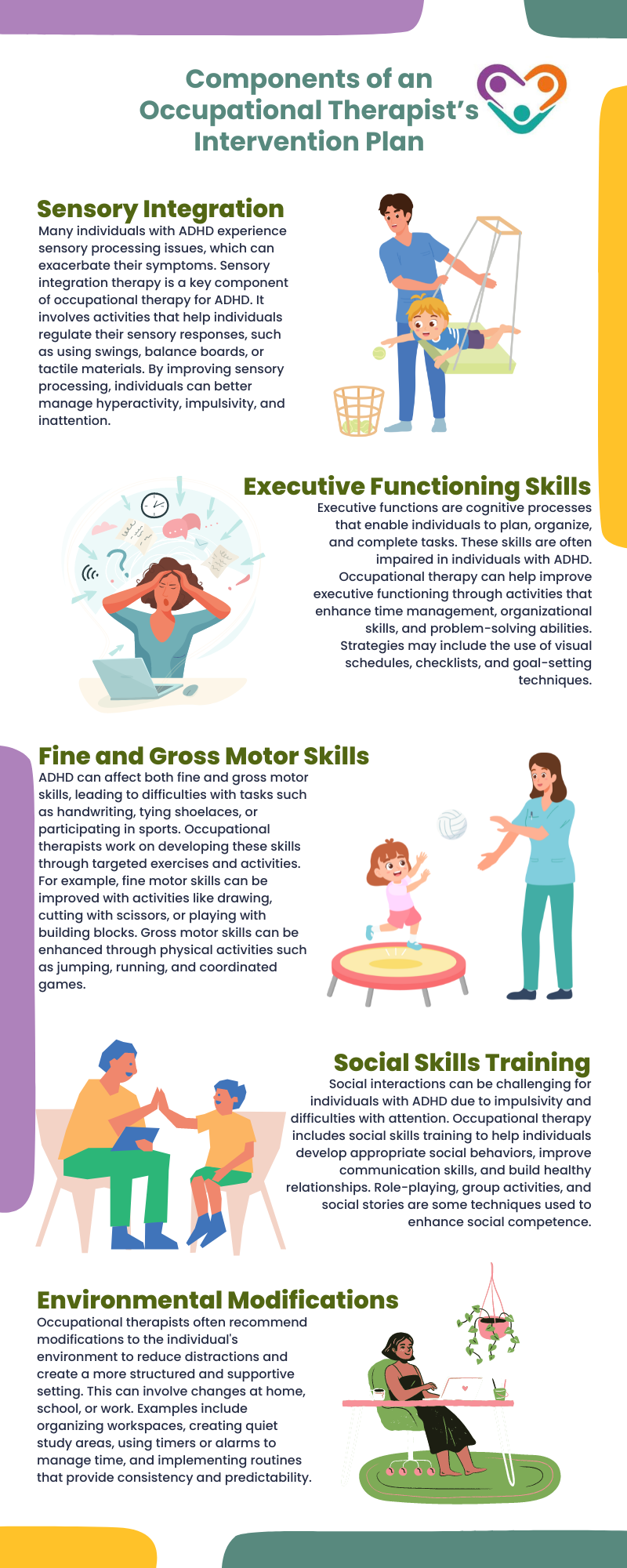Attention deficit hyperactivity disorder (ADHD) is a neurodevelopmental disorder characterized by symptoms that can lead to difficulties in academic performance, social interactions, and everyday functioning.
While medication and behavioral therapies are commonly used treatments for ADHD, occupational therapy (OT) is increasingly recognized as a valuable intervention. Let’s look at how occupational therapy can help individuals with ADHD manage their symptoms and improve their quality of life.

Can Occupational Therapy Help With ADHD?
Yes, occupational therapy can help with ADHD. Occupational therapists work with individuals with ADHD to develop skills and strategies to manage their symptoms and improve daily functioning. Through various interventions, such as sensory integration techniques, organization skills training, and time management strategies, occupational therapy aims to enhance attention, self-regulation, and executive functioning.
These interventions can help individuals with ADHD to better handle everyday tasks, improve their academic performance, and increase their ability to participate in social activities.
Occupational therapists also collaborate with families and teachers to create supportive environments that cater to the specific needs of individuals with ADHD. This holistic approach ensures that the interventions are practical and applicable in real-life situations.
By addressing sensory processing issues and fine motor skills, as well as creating structured routines, occupational therapy provides individuals with ADHD with the tools they need to succeed and thrive in various aspects of their lives.
ADHD and Its Impact
ADHD affects approximately 5-10% of children and around 2-5% of adults worldwide. It is typically diagnosed in childhood, although many individuals continue to experience symptoms into adulthood. The disorder manifests in various ways, including difficulty sustaining attention, hyperactivity, impulsive behavior, and problems with executive functioning.
These symptoms can lead to significant challenges in daily life. Children with ADHD may struggle in school due to an inability to focus on tasks, follow instructions, or sit still during lessons.
Adults with ADHD might find it difficult to maintain consistent employment, manage time effectively, or handle organizational tasks. The impact of ADHD extends beyond the individual, affecting family dynamics, social relationships, and overall mental health.
The Role of Occupational Therapy in ADHD
Occupational therapy aims to improve the functional abilities of individuals with ADHD by addressing their unique needs and challenges. The therapeutic process begins with a comprehensive assessment, during which the occupational therapist evaluates the individual’s strengths, weaknesses, and specific areas of difficulty.
This assessment helps to develop a personalized intervention plan that may include the following components:

Evidence Supporting Occupational Therapy for ADHD
Several studies and clinical observations support the effectiveness of occupational therapy in managing ADHD symptoms. Research indicates that occupational therapy interventions can lead to significant improvements in various areas, including sensory processing, executive functioning, motor skills, and social interactions.
For instance, a study found that sensory integration therapy significantly improved attention and behavioral regulation in children with ADHD. Another study reported that children who received occupational therapy exhibited better motor skills and greater independence in daily activities compared to those who did not receive such intervention.
Moreover, a review article highlighted the positive impact of occupational therapy on executive functioning skills in individuals with ADHD. The review noted that interventions targeting time management, organization, and planning were particularly beneficial in helping individuals manage their symptoms and improve academic and occupational performance.

Case Studies and Real-Life Examples
Real-life examples and case studies further illustrate the benefits of occupational therapy for individuals with ADHD.
Consider the case of a 10-year-old boy named Alex, who struggled with attention and hyperactivity in the classroom. His occupational therapist developed a personalized intervention plan that included sensory integration activities, such as using a weighted blanket and engaging in tactile play.
Additionally, Alex worked on improving his executive functioning skills through the use of visual schedules and organizational tools. Over time, his ability to focus in class improved, and his teachers reported a significant reduction in disruptive behaviors.
Another example involves an adult named Sarah, who faced challenges in managing her time and staying organized at work. Her occupational therapist introduced strategies such as using a planner, setting reminders, and breaking tasks into smaller, manageable steps.
Sarah also participated in social skills training to enhance her communication with colleagues. As a result, she experienced increased productivity at work and better interpersonal relationships.
Integrating Occupational Therapy with Other Treatments
While occupational therapy offers valuable benefits for individuals with ADHD, it is often most effective when integrated with other treatments. Medication, behavioral therapy, and educational support are commonly used alongside occupational therapy to provide a comprehensive approach to managing ADHD.
Medication, such as stimulants and non-stimulants, can help reduce core symptoms of ADHD, allowing individuals to focus better during occupational therapy sessions. Behavioral therapy, including cognitive-behavioral therapy (CBT), can address underlying emotional and behavioral issues, complementing the skills learned in occupational therapy.
Educational support, such as individualized education programs (IEPs) and accommodations, can create a supportive learning environment that aligns with the goals of occupational therapy. By working collaboratively with teachers, parents, and other healthcare professionals, occupational therapists can ensure a holistic approach to treatment.
For individuals with ADHD and their families, seeking the support of an occupational therapist can lead to significant improvements in daily functioning, academic performance, and social interactions. If you’re looking for ABA services in New Jersey, Georgia, Indiana, and New York, Golden Care Therapy is here to help. Contact us today to book an appointment and learn more about our services.
Sources:
https://www.healthline.com/health/adhd/can-occupational-therapy-help-people-who-have-adhd
https://www.medicalnewstoday.com/articles/occupational-therapy-for-adhd
https://www.movingwithhope.org/posts/better-mind-and-body-occupational-therapists-and-mental-health

